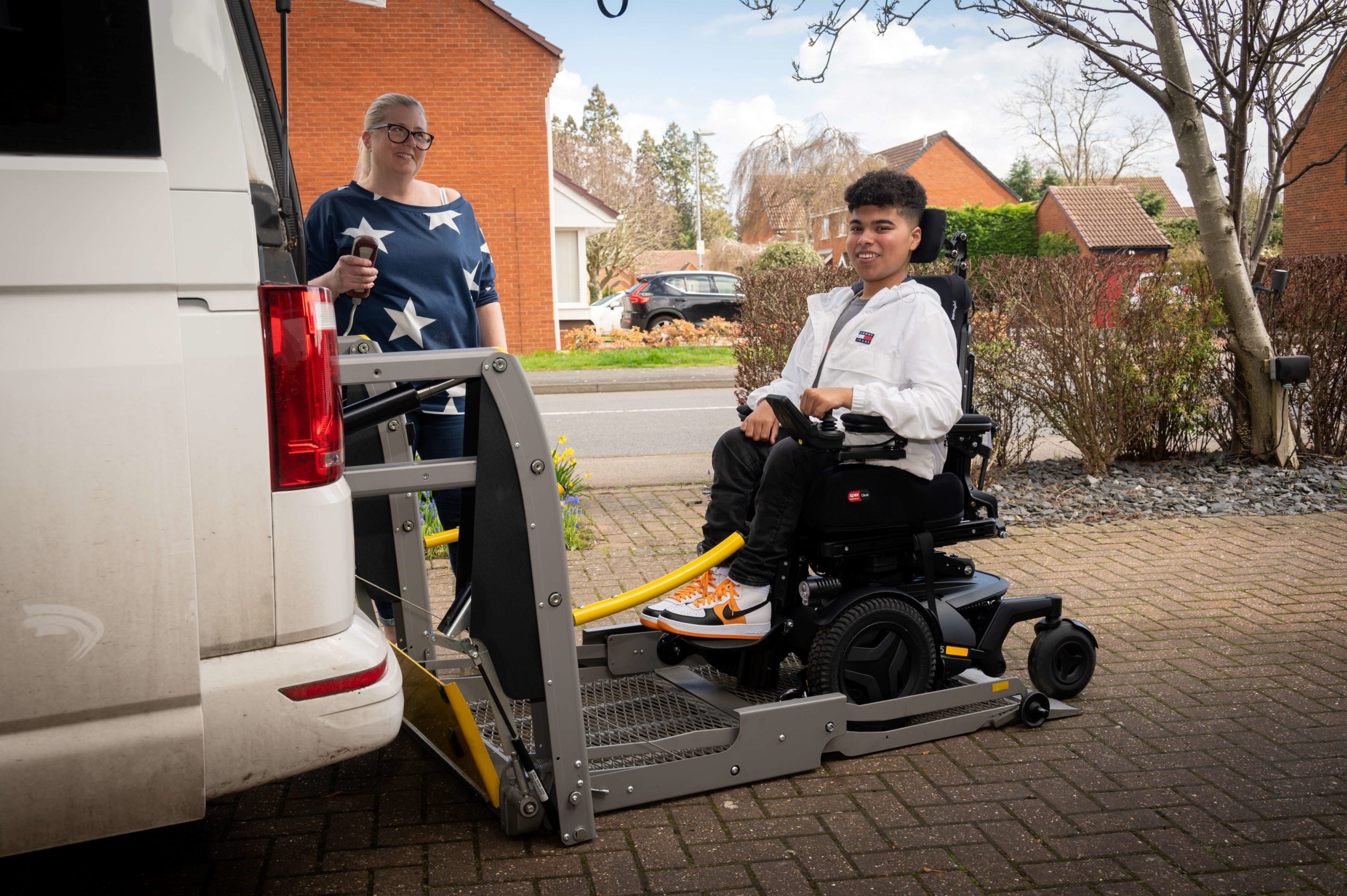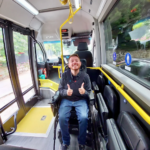Adults Living with SMA, Transport, Leisure & Holidays

Adults Living with SMA, Transport, Leisure & Holidays
Last reviewed: August 2024
Hubs Mobility Advice Service > is free. It is provided through a website and via 15 of the 24 nationwide Driving Mobility > centres. Advisors work through all possible options to give information and guidance on the best accessible travel options for an individual. The service is supported by the NHS, Driving Mobility and the Department for Transport.
Phone 0800 559 3636
For information about driving assessments, vehicle adaptations, wheelchair accessible vehicles, insurance, tax and the motability and blue badge schemes
For learning to drive, go here >
You can find information about flying with a disability at:
Your right to special assistance is stipulated in UK law and applies when you fly:
- On any airline from a UK airport
- On an EU or UK registered airline to an UK airport
- From outside of the UK or EU to the EU on a UK carrier
You should aim to give your airline 48 hours notice of the help you need. This can be from the moment you arrive at an airport and can cover:
- your journey through your departure airport
- boarding the aircraft and during the flight
- disembarking the aircraft
- transferring between flights
- travelling through your destination airport.
Similar passenger rights apply in other countries including the EU and the United States. However, there are many parts of the world where similar rights are not available. Assistance may require a fee or not be available at all.
Medical Assistance
If you are going to need assistance on the plane or at the airport, it’s best to let the airline know at least 48 hours before your journey.
You may be asked to fill in an Incapacitated Passengers Handling Advice Form (what a terrible name!), or your doctor may need to complete a Medical Information Form.
Your doctor can contact The Civil Aviation Authority Aviation Health Unit if they have a query which is not covered in the CAA’s website guidance and where guidance is not available from the airline.
If you use a ventilator, the airline will need to be told well in advance of your travelling, especially if you may need to use it on the plane. Some airlines offer oxygen on-board or alternatively you may need to take an oxygen concentrator. Oxygen needs to be pre-ordered with the airline and some airlines charge.
Travelling with a powerchair
If you use a powerchair, check that the airline will carry it in the plane’s hold. The airline will need to know its size, weight and battery type. Two pieces of mobility equipment can be carried free of charge from the UK to anywhere in the world, but this may differ on the return flight. Check in advance with the airline.
Powered wheelchairs need to be made safe before they can be stored. The electrics need to be disengaged. This can usually be done with an ‘airsafe plug’, which the airport may supply, or you can buy one before you travel. If an ‘airsafe’ plug cannot be used, the battery will need to be disconnected. A photocopy of the relevant section of the equipment handbook can be useful to help airport staff to do this correctly.
Wheelchair manufacturers can provide an airline battery safety certificate.
You may be able to stay in your chair until you reach the side of the plane and then transfer into an on-board wheelchair to access the plane. Manual slings or a hoist may be used to assist you to transfer from your chair to an on-board wheelchair or onto the seat on the plane. Cabin crew will not lift or transfer passengers. Once you are in your seat on the plane, if you need to move during the flight you will have to be assisted by your partner or PA.
Civil Aviation Authority / Travelling with Mobility & Medical Assistance
Other Assistance
If you cannot access a toilet during a flight and need to use a device, like a uribag, you must inform the airline in advance. You will need to let them know the name of the device. This is because there may be issues with the safe disposal of the contents from some toileting devices. The airline will try and assist with privacy while you are using a toileting device – for example, by holding up a blanket.
If you need supportive seating, you can talk to the airline’s customer services before you travel to make sure that it’s compatible with the airplane seats and seatbelts.
Tryb4uFly – to test seat options and hire equipment
Seat Guru – to check where seats are on planes and the amount of legroom available
Civil Aviation Authority / Travelling with an assistance dog
For more information, please see the Equipment section.
For information and links scroll down.
In this podcast episode, Ross, Luis and Ellie discuss their experiences of getting around and using public transport
Recorded March 2024
Boats & Ferries
Most UK ports have good facilities for disabled travellers, but services can vary in Europe.
Before you book a ferry crossing or cruise, check with the operator or travel agent that they will be able to help with any requirements you may have.
Going on a cruise:
"In 2003 I embarked on a week cruise to the Canaries. My first taste of foreign sunshine in 20 years!!! It was amazing! The cabin was perfect, the ship completely accessible and the staff couldn’t do enough to help. There was even a dedicated person who was able to offer advice regarding the accessibility of ports and help arrange accessible shore excursions. Aside from the initial trepidation of trying something new, I can honestly say that compared to previous holidays it was completely stress free! All in all I was hooked and suddenly the world opened up to me!"
Katy.
Buses
All buses most have ramps and designated wheelchair spaces inside the bus.
A national bus concession scheme for disabled people is run by local councils and operates differently in different parts of the UK.
- Contact your Local Authority for more information.

- If you live in London most of the time, check if you are eligible for a Disabled Persons Freedom Pass and what it would cover.
Read Ross’ account of travelling by bus in Cornwall >
Coaches
There is no national concessions scheme for coach travel, but worth asking any coach operator if they offer any discounts. Accessible coaches are provided by:
- National Express
- Oxford Tube
- Megabus
- Gold Line (Northern Ireland)
- City Link (Scotland).
Community Transport
This local door-to-door transport service is often called ‘Dial a Ride’ or ‘Ring and Ride’. It is usually run by local councils or transport authorities. They can be booked in advance and are cheaper than taxis. It generally cannot be used for everyday trips when alternative transport is available.
MotorBikes
- The National Association for Bikers with a Disability – for advice and grants to enable bikers to continue biking.
Taxis
All black cabs in London, must be accessible for wheelchair users. How accessible they really are can vary.
Outside London, local taxi licensing offices can tell you what is available.
It is illegal for taxi drivers to discriminate against wheelchair users.
Some areas have taxi concessions in place which make taxi travel cheaper:
- Contact your Local Authority for more information.
- If you live in London most of the time, check if you are eligible for a Disabled Persons Freedom Pass and what it would cover.
- A London Freedom Pass holder who finds public transport too difficult to manage without assistance may be eligible for the London Councils’ Taxicard scheme.
Trains
All rail vehicles in service have to meet the Rail Vehicle Accessibility Regulations (RVAR).
- Check if you are eligible for a Disabled Person’s Railcard
Most stations have portable ramps if the train doors are not level with the platform. Access at most large stations is generally pretty good. You need to book free assistance in advance so that a member of staff is ready with a ramp when you get on and off. Train companies ask for at least 24 hours’ notice.
Book through the train operating company, in person at a local station or online:
- National Rail
- Disabled Persons Railcard/travel assistance
Once booked, Passenger Assistance is treated like a reservation. You and the staff at the relevant stations each get an email record of what you’ve been booked and when it’s for.
If you live in London most of the time, check if you are eligible for a Disabled Persons Freedom Pass and what it would cover.
Tube in London
These guides tell you which stations are accessible:
- Transport for London
- Transport for All
- If you live in London most of the time, check if you are eligible for a Disabled Persons Freedom Pass and what it would cover.
As access is such a barrier to so many activities, we provide links to accessible inclusive national organisations. You will also find some related SMA Community discussions that may be of interest.
Many of you will be used to the extra thinking you have to do for holidays. For some of you though, it is new. This section will hopefully be useful and may even have some ideas for seasoned travellers.
Tips and ideas from our What’s App Groups:
July 2024: some people are signing up for an Access Card which costs £15 for 3 years. It is a photo ID that can be used to easily communicate your access requirements to events and venues. It also works online with other platforms like ticketing systems, to unlock the access facilities you need.
Accessible Loos
These can make a big difference to a day out.
Accessaloo App – uploaded and rated by users worldwide.
Changing Places toilets provide a height adjustable changing bench with hoist and plenty of space. Visit their website for more information and a map of where Changing Places can be found.
The National Key Scheme for accessible toilets that can be found in shopping centres, cafes, department stores and in bus and train stations around the country. To unlock the toilets, you’ll need to buy a RADAR key.
ToiletMap – Great British Toilet Map gives opening hours and locations – use the filter to find accessible toilets.
Where to go.
These websites are full of ideas, tips and advice:
If you don’t usually use a wheelchair and don’t have one but get tired when you are out, speak to your physio or OT. It may be helpful use one sometimes – perhaps for days out at big venues. They will be able to advise you how to go about getting one.
AccessAble – access information for over 120,000 places of interest in the UK
Accessible Boating – charity offering day trips on an accessible boat.
CanalAbility – charity offering accessible canal boat day trips
A CEA Card (Cinema Exhibitors’ Association Card) works nationally. It entitles you to one free ticket for a person accompanying you. To apply, you need to be receiving a Personal Independence Payment (PIP). The card currently costs £6.00 a year.
Euan’s Guide – access reviews from disabled people and their friends and families. Covers tourism and entertainment venues as well as post offices, supermarkets and railway stations.
Kids Days Out – child friendly activities across Britain and whether they are wheelchair accessible throughout.
National Trust Accessibility Guide.
Seagull Trust (Scotland) – a charitable organisation, wholly run by unpaid volunteers, providing free barge trips for people with special needs. They have fully accessible boats suitable for wheelchairs.
The Rough Guide to Accessible Britain includes accessibility information, including disabled parking and reviews, hints and tips written by disabled visitors.
